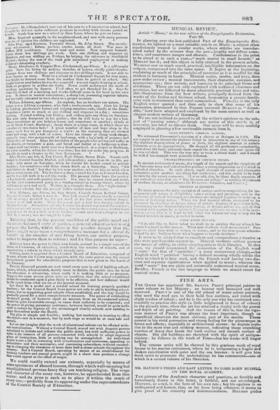MUSICAL REVIEW.
Article " Music," ix (lie new ediatirunc4the Encyckpredia Britannica,
Part 8
In glancing over the last-published Part of the Encyclopaedia Bri- tunnica, we lighted on a most valuable article on Music : a subject often injudiciously treated in similar works, where articles are manufac- tured rather by the scissors than the pen—lengthy and diffuse some- times, and sometimes meagre and obscure. Condensation is the point to be aimed at in such a case—" much matter in small bounds," as NIORLEY has it; and this object is fully attained in the present article. We never saw so much sound, practical, intelligible information on the subject, compressed into the same space. It begins at the beginning, explaining as much of the principles of acoustics as it is needful for the student in harmony to know. Musical scales, modes, and keys, then pass under review ; musical instruments, their character, compass, and appropriate use ; then melody, and harmony in its principal forms and attributes. These are not only explained with technical clearness and precision, but are followed by many admirable practical hints and valu- able illustrations from the best writers, principally derived from the works of the Italian and German school, bespeaking a greater famili. arity with instrumental than vocal composition. Peacaaa.. is the only English writer quoted ; and then only to show that some of his harmonies, denounced by that flippant coxcomb BURNEY as " detest- able," have been adopted and employed by the most correct as well &Ss elegant modern writers of Germany. We arc not inclined to accord to all the writer's opinions on the sub- ject of "passing notes ;" although our notice of this article is, of
necessity, too brief to discuss them. Our space will be more usefully employed in gleaning a few serviceable extracts from it.
CRESCENTINI'S CHORAL SCHOOL.
We witnessed Crescentini's training of a chorus at Bologna in 1:49. His ear caught in an instant the slightest defect in intonation in any of the voices ; the slightest disproportion of piano or forte, the slightest attempt at embel- lishment, even an appoggiatura. He stopped all the performers immediately, pointed out the fault, and made them repeat the music over and over again tall he was satisfied. This was the true way to train a choral band : and it would be well if his example were generally followed.
CHARACTERISTICS OF CHURCH MUSIC.
In ancient ecclesiastical music, the length of the sounds and the simplicity of the harmony were well calculated to produce a strong impression on the mind in
cathedral churches. In such places, rapid changes of sounds and chromatic harmonies never produce any thing but confusion ; and this ought to be kept in view by the young composer. [Let us add, also, by those dandy organists of our cathedrals who dish up " The !leavens are telling," or rattling movements
of modern Masses, as substitutes for Pune Gianoxs, and Caur MODERN SUBLIMITY'.
To many persons the noi-y confusion of certain modern compositions fur in- ...true:eats and voices is delightful ; voices yeiiing and growling, aad in the orchestra all sorts of hoterogetuanis iu-truments mingled together to make up a ellorns of lielf4:11illg 110k,. When we find musical effects attempted to ba produced by stacking of whip', fain.; of pistols, jingling of p.,-t- horse bells, tin miming on the Russian boasiag of drums, and so oa, :mil all this
received with ruiittwe by a eiviliziol atli.nice, we may atoll be justi.
tied in cn in; tit it is hard to tell what the human ear may ur may not be trained to reiiali in music, or rittli,r iu noise.
CODA rito3t PICCINI.
"I should like to know what we shall do to awaken the ear when it be. comes hardened to this riprow. What new iliablerie shall we contrive? Pees haps we shall then wish to rein n to nature, and to the tine means acknows. leigetl by art : but:yott know what happens to brandy-drinkers."
It were to be wished that so excellent and compendious a treatise as this were purehaseable separately. Musical students seldom possess
the means of adding an entire temp:lop:Llia to their libraries. In this
case, we should recommend the restoration of the English word " score" for that of "partition :" a most unnecessary change,—the English word " partition" having a defined meaning wholly unlike the sense in which it is here used, and the French word having two dia.. tinct and separate signifieations when applied to music ; whereas the word " score " has one plain and universally understood musical sense. Besides, French is the last language to which we should resort for musical feints.


























 Previous page
Previous page